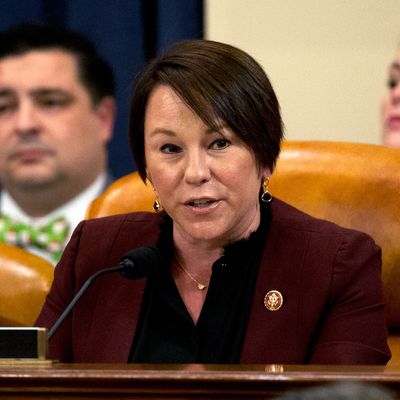
Another feature of the 2020 congressional landscape that’s being obscured by the coronavirus pandemic is the GOP’s very poor efforts to increase its overwhelming gender imbalance.
Yes, Republicans can boast of nine women as senators (as opposed to 17 Democratic women in the upper chamber). But their numbers are very unlikely to rise (men are their certain nominees against the only currently vulnerable Senate Democrats, in Alabama and Michigan), and could definitely fall (Susan Collins of Maine, Martha McSally of Arizona, Kelly Loeffler of Georgia, and Joni Ernst of Iowa are all in competitive contests).
In the House, Republicans sport a pathetic number of women: 13 of their 197 Members, as compared to 88 Democratic women. And as Roll Call’s Nathan Gonzales reports, the odds of any growth in the ranks of House Republican women are at best mixed and limited:
Even though more Republican women have filed to run for the House in at least the last 30 years, getting elected is another story.
One of the easiest ways to increase the number of women is to elect them in open seats in districts that are solidly or leaning Republican. That often requires navigating a competitive primary, rather than having the additional hurdle of defeating a Democratic incumbent.
This cycle, two GOP women are not seeking reelection, Martha Roby of Alabama and Susan W. Brooks of Indiana. But it’s plausible that Republicans won’t replace either with another woman.
The GOP nominee for Roby’s seat will definitely be a man, and the leading female candidate for Brooks’s seat may be too extreme to win the general election. Other open seats in safe districts probably won’t nominate women:
Two other solidly Republican districts hosted primaries for open seats left by retiring members. But GOP voters in both districts nominated men. Republican Jay Obernolte will move on to the general election in California’s 8th, which Trump won by 15 points in 2016 and is currently represented by Rep. Paul Cook. Rep. Mac Thornberry is not seeking reelection in Texas’ 13th, where Trump received nearly 80 percent of the vote, and Josh Winegarner and Ronny Jackson moved on to the GOP runoff. Elaine Hays finished fourth in the primary with less than 8 percent of the vote.
Yes, there’s one open seat that will likely replace a male GOP incumbent with a woman: Illinois’ 15th District, where Mary Miller has won a primary to succeed retiring congressman John Shimkus. But most of the women winning GOP primaries are in tougher territory:
Some of Republicans’ top House candidates are women, including Orange County Supervisor Michelle Steel in California’s 48th and state Rep. Nancy Mace in South Carolina’s 1st. But they are two good examples of the difficult road Republicans have to travel through well-financed Democratic incumbents to increase the number of women in the House.
So the House Republican Caucus will continue to be mostly a boy’s club, even as Republicans wonder why they do poorly among women in the electorate.






























